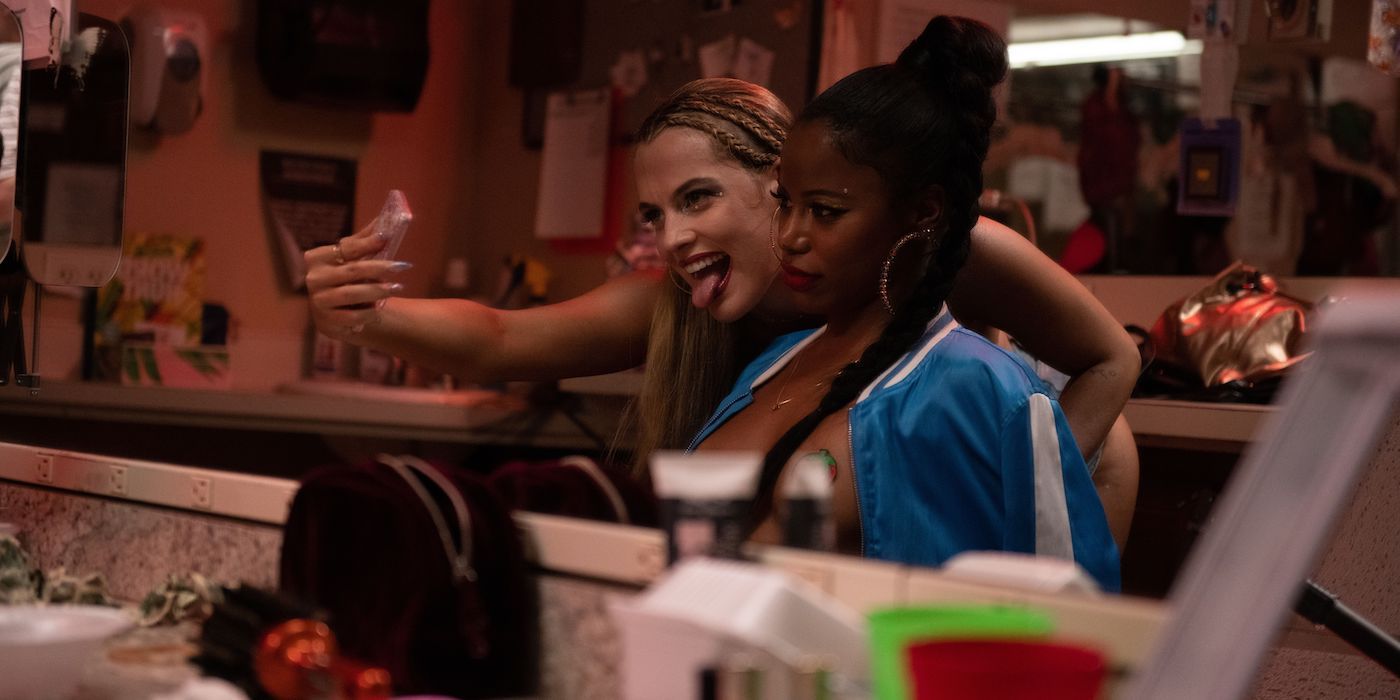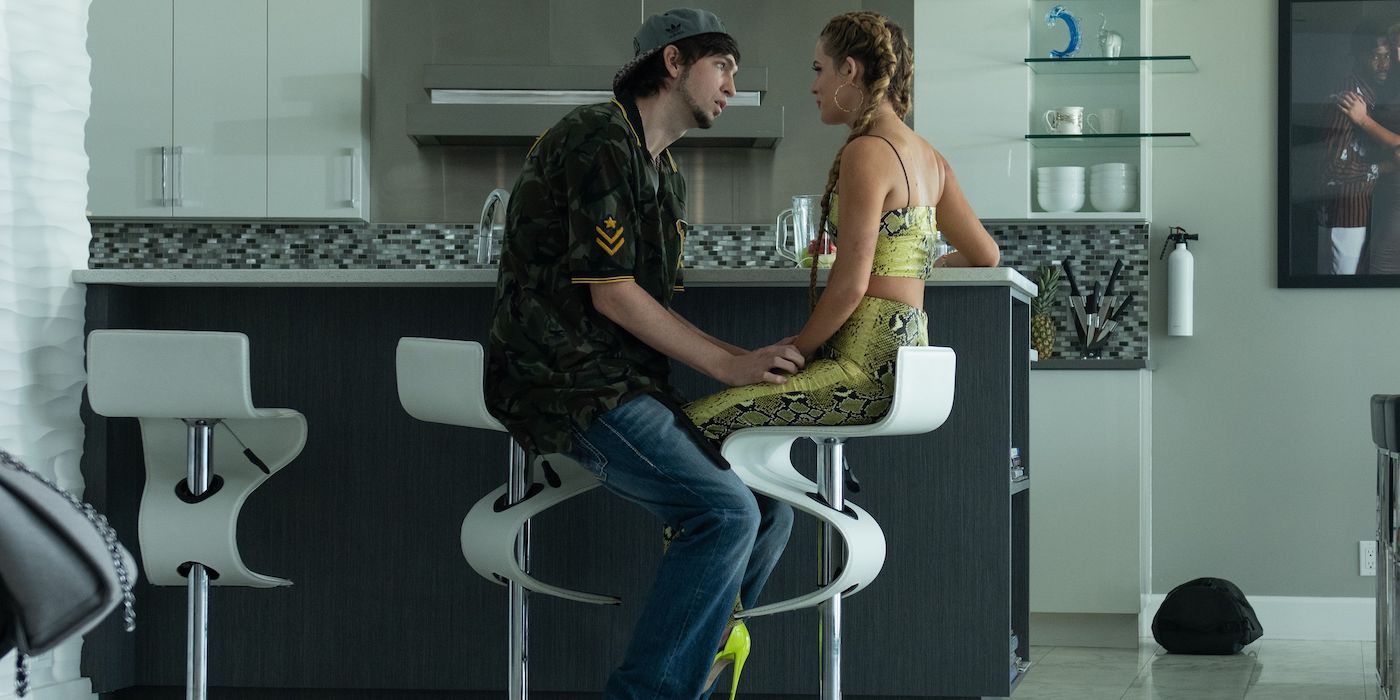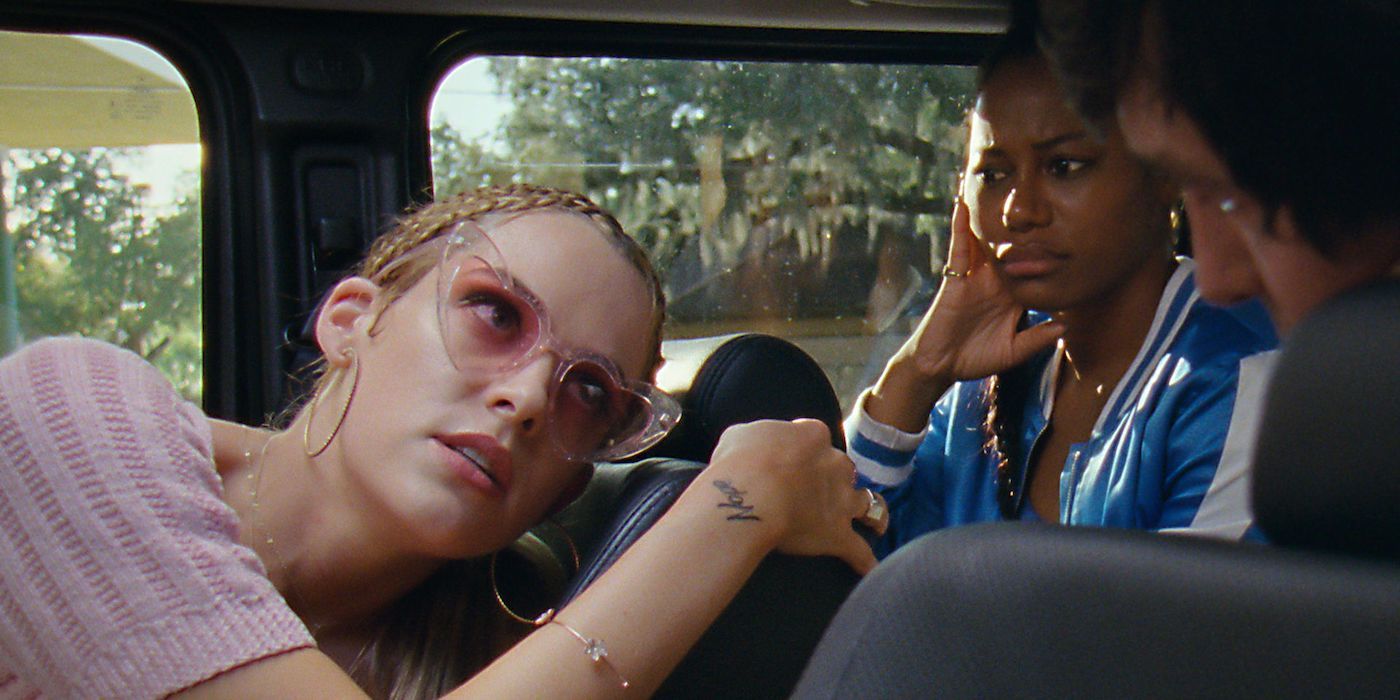Editor's note: The following contains spoilers for Zola.Morality exists in Zola, Janicza Bravo's phantasmagoric filtration of a true, fiendishly entertaining Twitter thread — even though the film is jammed unsubtly with lies, crimes, violence, sexual deviance, and racial appropriation. Throughout the propulsively paced comedy-thriller, two anchors of morality, of conscience, of kindness are in constant tension of being installed versus being ripped away by the tides.
One of these anchors gains its strength from a sense of self-worth, of observance, and of smartness. The other erodes consistently from a lethal combination of insecurity, of obliviousness, and ultimately, of sincere stupidity.
Our title character Zola (Taylour Paige) is positioned as a reactive protagonist, the Nick Carraway to Stefani's (Riley Keough) Jay Gatsby. The plot happens around and to her, motivated by the horrific decisions and impulses of Stefani and X (Colman Domingo). But this storytelling structure does not make her "passive." She is a survivalist, a chameleon, a person who will do anything she needs to stay alive. She's used to an uncaring world full of vultures of her time, money, energy, and culture, and she's developed the tools and boundaries required to retain her humanity in the process. Her narration is terse, bemused, elevated and removed by the chaos around her, because it has to be. Her diegetic dialogue speaks directly to this self-aware need for armor. "Who are you gonna be today, Zola?" she asks herself in the mirror as she samples different stripping outfits; "Who's looking out for me?" she asks X when he demands she perform yet another life-risking stunt for these total strangers.
But Zola isn't unkind. At the center of this armor is a strong, almost knee-jerk obligatory sense of conscience. She flows along with Stefani's dialectical affectations swimmingly and smilingly, the film's usage of subtitles showing us how in sync they are (or more complicatedly, how much Zola needs to blend into someone else blending into her to survive). When she finds out X is Stefani's pimp and they've been disingenuously sent to a motel room for a long night of sex work, Zola can't help but clean up the mess, grabbing Stefani's phone, boosting her online profile, taking better pics, and charging more money; not only does she help them survive, she helps them thrive. When people start to fuck in front of her, she simply turns away and kvetches to us briefly in the narration. In the most extreme moments of the film's intentional discomfort, Zola's body, so often exalted by Bravo and DP Ari Wegner's photography, is often used and abused by X in order to get what he wants; but in the most explicit scene of abuse from Jason Mitchell's Dion, seemingly egged on by X, Zola realizes it's a ploy for the crew to gain the upper hand on him, and does not move an inch for the purpose of "the greater good."
Most importantly, Zola isn't unkind to herself. At every chance available to her, she speaks up and advocates for herself, demanding she knows her worth and she needs to get the hell out of this nightmare ASAP. She knows her own humanity, knows what it takes to survive, and knows that she has to help others without betraying these first two values. She's one of the smartest, most cunning avatars of "neutral-good" morality I've seen in a film protagonist in recent years.
I cannot say the same about Nicholas Braun's Derrek.
Derrek's dumb, man. He's a doofy, lanky white guy who doesn't seem to have made a single decision about himself. Whereas Stefani's affectations feel purposeful and immersed, Derrek's feel ill-fitting, shy, and reluctant. He is painfully bad at observing realities, preferring to cling to comforting, wishful ignorance. He's not gonna be stuck in a gross motel room all night; his girlfriend isn't unhealthily attached to her abusive pimp; Dion is a new friend, not a ruthless adversary; he's going to become a Vine comedy star. None of these core beliefs are true, and you will never get Derrek to believe that. And it's not like the world is putting bumpers on the bowling lanes for him; beyond Stefani's increasingly disingenuous pleas that their love is monogamous and equitable, Derrek is pretty relentlessly shit on, at one point cleaning up his own vomit under the barked orders from X. Unlike Zola's crafting of necessary and battle-tested social armor, Derrek has done no work to shield himself. You can poke right at the guts and strike blood every time.
But Derrek's stupidity doesn't come from malevolence. In fact, Derrek might be the kindest, and even most endearing character in the entire picture. He feels like those inflatable clown punching bags; sock him in the face and he'll just pop the hell back up, a goofily optimistic smile plastered on his punchable face. With any sense of self-reliance, awareness, or smartness stripped away, Derrek operates on pure, gooey "conscience." He's a sweetheart in a world of venomous intentions, a lighthouse of idealism boats keep crashing into. At one point in the film, he and Zola exchange dialogue in a car while waiting for Stefani. Zola, very understandably, shows him her weariness, her shield, her strengthened boundaries. But Derrek just shows her another Vine video of a doofy, lanky white guy crashing into something over and over. This clinging moment, this need for someone to be kind to him without any work on being kind to himself, provoked an audible "Aww" in my audience. We empathize with Zola, but we sympathize with Derrek.
Zola, smartly and even in its most pointed moments of satire, refrains from making explicit judgments. Bravo confidently and stylishly shows everything that happens, and even as Zola directly "tells us" what she's thinking and feeling throughout, the film itself makes no such bald editorial accusations. It trusts that, like its titular protagonist, we will observe everything that's happening and make our own self-aware judgments with accuracy.
So which version of the film's morality and conscience would you rather be? Let's put it like this: In the film's abrupt ending, where our motley crew finally drives their asses back to Detroit, Zola is seen miffed but relieved, staring out the window, surviving everything with her humanity intact, already figuring out how to be the powerful author of this experience. Derrek is seen with a giant, bleeding gash in his head having recently tried to commit suicide by jumping out of an apartment building because the people who never respected him continued to not respect him.
What sounds better to you?




